Home | City Notes | Restaurant Guide | Galleries | Site Map | Search | Contact
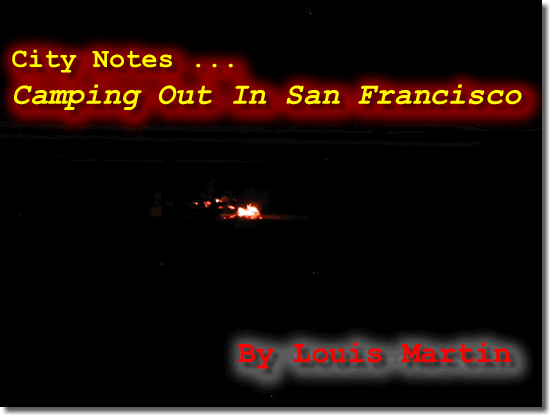
San Francisco—December 9, 2007
So much for Treasure Island RV Park, I decided. I would "camp out" in San Francisco for a week or two and see how it went.
It was Friday night and first I hit Les Joulins Jazz Bistro, Cafe Claude, Cafe Bastille, and Enrico's. I must have had the feeling that I was going out of circulation for awhile to hit all those places. Then I headed down to Ocean Beach, which I thought might be a safe starter. Past the Cliff House I wandered down the hill to the big parking lots below.
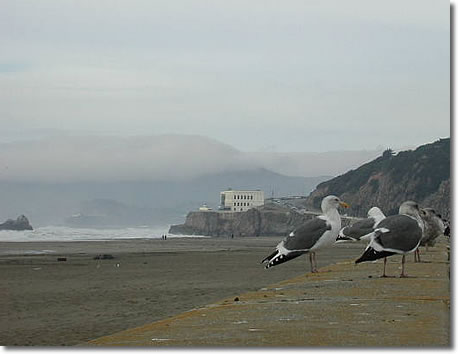
I pulled into the second of the two lots, the bigger one. I turned off the engine and just sat for awhile in the dark. There were other vehicles in the lot and a couple of blazing fires out on the beach. I could see figures illuminated by the flames.
I am sitting there a half hour or so like this when a car pulls up right next to my van. Boom-Boom-Boom. The speakers are turned up full volume. Four young guys jump out of the car and run towards the beach. I'm irritated that they park right next to me—there is lots of space in the lot—and move my van away from their car. There is at least one advantage to camping out in San Francisco: If you don't like your neighbors you can just move. Of course there is another advantage: The rent. There is none. Imagine that!
Now at Treasure Island RV Park I was paying someone—it is never clear exactly to whom one pays rent—$775 per month to park in the dirt with a hole in the ground for waste, a water hookup, and electricity. A pretty basic level of service in the rental market. From what I recollect it was owned by a rental company in San Francisco. Now of course you could rent an apartment a lot of places for that kind of money, so I figured this company had a pretty good deal going for it in terms of profit.
But now I had cut them out of the picture, at least for awhile, but found myself staring at No Parking signs that specified the hours when you were to refrain from parking: 10 AM to 5 PM. Yes, just when a person who is camping out would like to get some sleep. Sleep, as you know, is a necessity at times and the law was making it clear that you were not to be doing anything necessary here. But I was not bothered the first night out.
The second night was another matter. At 3 AM I have just finished reading the newspaper and am relaxing with a glass of wine, thinking of sleep, when I see the blinking yellow lights out my rear window and hear a horn. The lights don't go away so I get out of the van and see that it is a meter maid, a heavy-set black woman. "Street cleaning," she announces. She's irate when I ask if the lot is closed. I start securing stuff in the van so that nothing falls over when when I drive away—coffee pot, wine bottle, glasses ... I head south on the Great Highway and look for a less public place.
Between Lincoln and Sloat the Great Highway splits in two. There is the beach strand of it and there is the strand that runs in front of the apartments facing the beach. It is unusual to have two roads with the same name but that is the way it is over in Ocean Beach for a mile or so.
Between the two highways is a mound of grass and in places trees. It looks like a fairly safe spot to camp out. I pick a spot with trees on the apartment-facing strand of the Great Highway—parking is not allowed at all on the other strand—and pull over and pull the blinds. For awhile I sit in the back of the van with the lights off.Then I turn on one light, rotated toward the van ceiling so that it gives off only dim light, and read some more, straining to see the words. I don't want to get busted this early in the game. Then I sleep on the floor of the van. There is a bed in the van in the back and a curtain that I can install up front, but I don't want to install the curtain, as I think it is a give away that someone is living in the van. I want to avoid detection; I do not want to be identified as a law breaker and a person who has no respect for rent paying. I awaken to the sound of landscapers in the morning; one is using a chain saw to hack off the branches of a small tree. They walk by my van but don't seem to notice me in the bottom of the van. I wait till they are gone, then move the van back to the parking lot, where it is now legal to park—even sleep—at this hour. Does this mean the city, or The City, is encouraging people to sleep during the day? I doubt it but it does encourage me to do so. Rent-free sleep on the beach with a gentle breeze and the sound of surf in the background—how sweet can sleep be?
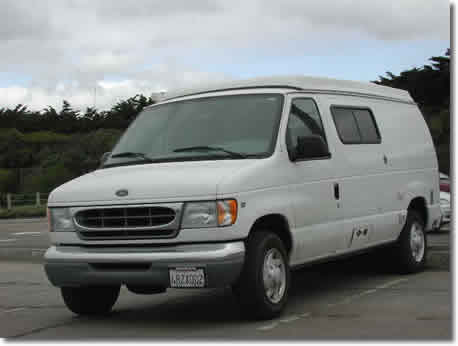
When I finally got up I drove over to Devon Storage in the Mission where I have stuff stored and got more pillows. If I was going to sleep on the floor of my van, I at least wanted to be comfortable. (Note: Later in the week I began to sleep in the van bed with the curtain installed and all lights off.)
After selecting three colorful pillows, one quite large, I drove to downtown San Francisco to scout out more camping sites. Core downtown did not look promising. I then drove over to the Embarcadero and looked it over for awhile but concluded it was not good either. Meters, meters, everywhere. And eyes upon you. Much too upscale. Camping out there would probably lead to a citation or an arrest. But south of Market along Brannan Street I found a little space that looked non-threatening and camped out long enough to run up to Golden Gate Perk internet cafe on Bush Street, the UPS Store on Sutter, and finally Le Central for a drink. I talked with bartenders Dave and Will but did not tell them what I was up to. Not many of their customers are camping out in San Francisco and I thought they might not understand. At this point, I was not sure if I understood exactly what I was doing either. The Christmas season was on and Le Central was full for a Saturday. I ordered a Ketel One martini, straight up with an olive, and, after two days of sleeping on the floor of my van like a fugitive, nothing could have tasted better. Maybe, with an extra drink or so each day, camping out in the high-rent city was the way to go.
One of the problems of camping out in the city is that the city is not set up for that: There is no place to dump waste, no place to take on fresh water, and no convenient showers. So a little tip if you are planning to camp out in a major city. Check for surrounding parks. You'll need to make an occasional visit.
The closest park to San Francisco with such facilities is Samuel P. Taylor Park in Marin. Just head north across the Golden Gate bridge and, about five miles north, take the Sir Francis Drake Boulevard exit. Samuel P. Taylor is a lovely little park that is on the way to the coast and Point Reyes Station. For $6.00 you can go in on a day pass, visit the dump site to get rid of both the gray and the brown stuff and take on fresh water. You can also get a hot shower at the front of the park for two quarters, more if you want a long one.
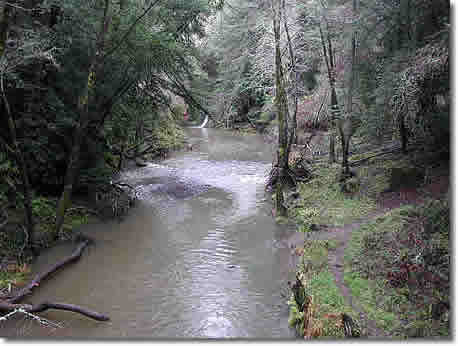
Now nothing feels quite so good as a shower when you have camped out for a couple of days. In my case my skin was beginning to itch and the shower did wonders for my mood. I went from feeling despondent to hopeful, even blessed. And the drive through the Marin countryside is a delight too. You will pass through one small town after another—Ross, San Anselmo, Forest Knolls, Lagunitas—through one agricultural valley after another, all the time among those marvelous Marin hills that look like mounds of earth dug up by hobbits or moles, until you reach Samuel P. Taylor Park, where the terrain turns more rugged and mountainous and where there are still good second-growth redwoods and a nice little salmon stream flows through the park. The rear of the park is reserved for overnight campers, the front for daytime use and picnickers. It reminded me of Hendy Woods in Mendocino, another gem of a park with "facilities."
I arrived back in San Francisco feeling like a new person and just in time to go out to dinner with Yan Yan. We decided to give the new Enrico's a try. It has been open about four months now, but since I have been away in Paris for the last three—no camping-out there—I have not tried it. We are now in the post-Enrico era. The great restaurateur passed away October 9 while I was away. I was curious to see what the new place was like.
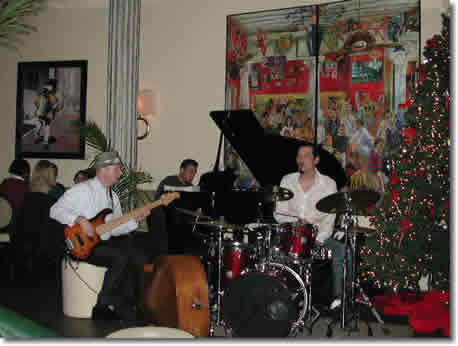
(Above: Josh Jones Trio at the new Enrico's.)
I can now say this: The new place seems okay so far. But I think that is all one can say. A restaurant has to be in operation for awhile before you can pass serious judgment. Certainly the new owner has made improvements in the interior with the new broad ceiling lights, the round, cushion-like seats, the booth facing the musicians, the separation between bar and restaurant, and the paintings on the walls. The floor is the same as before with big cracks in it. I don't know if that is preserving tradition or what. Cracks are not a bad thing in themselves and they fit the atmosphere of the old place. In the newer place, however, I'm not so sure. What is more uncertain, however, is the spirit of the place, which has always been bohemian. In fact, Enrico's is, or was, about the only place in San Francisco that has the bohemian quality about it. That is not something that can be created by clever restaurant managers or designers. To be bohemian requires authenticity, which is not something that money can buy and concept people can create. You cannot hire a web designer and create it from templates. It comes from a whole bunch of elusive things, organic and human in nature.
Anyway, as a mere camper in San Francisco I'm not going to be too picky with the new place. I had a quite delicious flat-iron steak on a bed of mashed potatoes. Compared to the salami sandwiches that I had been consuming in my van it was marvelous. And Yan Yan (pictured below at Yee's on Grant, not Enrico's) had BBQ ribs, also on a bed of mashed potatoes.
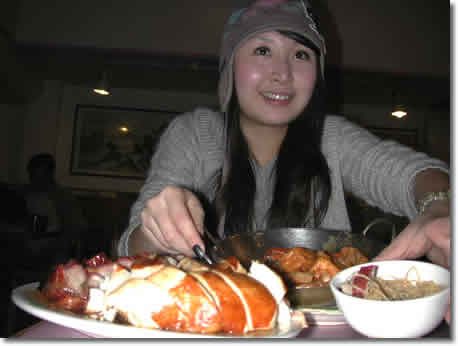
One nit: The plates came with no vegetables other than the potatoes. When we asked the waiter to bring us another vegetable, he brought us mashed yams. I don't think we needed two similar mashed vegetables. String beans might have been a better choice or carrots. But to a guy living in a van it tasted pretty good.
One pleasant surprise: At the bar was Enrico's legendary bartender Dave Nepove. He is working Sundays only. At the end of the meal I asked him to make me a coffee cocktail; he concoted a Spanish Coffee with real punch. Yan Yan, who doesn't drink, thought it was awful, which means it was very good. Later I stopped by Bix to catch Don Asher, the pianist. I don't know if it was the mood I was in or what, but he seems especially lyrical. Much better than the Boom-Boom-Boom music I hear so much down at Ocean Beach. I'm not saying that camping out in San Francisco is going to make the food taste better or the music sound sweeter, but it may sharpen your senses and make you more appreciative.
On Monday I go over to Crissy Field after hitting Trader Joe's for more salami and cheese. Ocean Beach is a wild beach whereas Crissy Field, on the Bay, is a gentle place. There the water is almost flat and in the background you can even see the high buildings in downtown San Francisco and of course the Exploratorium in the near background. I like Crissy Field but the parking lot is a busy one with people coming down to walk their dogs, go jogging, or just take a break from the day. Guys with delivery trucks stop by for a few moments, all kinds of other people. A lot of young woman from the Marina come by to jog, and they are a class of their own: jogging clothes, hair pulled up tight, ear buds ... They are enticing looking and I think they know it. At Ocean Beach you don't see this: There it is surfers and giant fires and no one seems to care how they look.
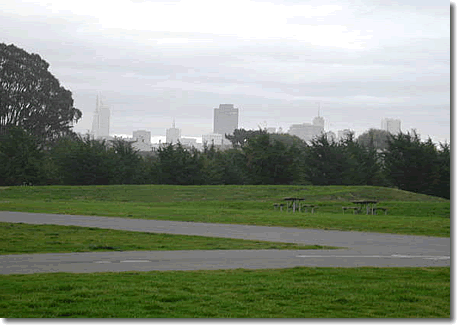
On Tuesday, down at Ocean Beach, I contemplated the difference again. Ocean Beach is the steady rolling in of waves, the pounding of the surf, the whitewater; it is the open sea battering the shore; it is the high drama of nature. To some I think it represents anarchy. Crissy Field, on the other hand, is the Bay, the protection from the harsher forces of nature. It is a place of repose. It obeys the "rules" of a polite society.
In the afternoon I went over to Trader Joe's on Masonic just off Geary. They had a wine guy there to answer questions and make suggestions. I asked him to select the best of the cheap Chardonnays. He was amused. People like bargains at Trader Joe's but usually they are not so blunt about it. His choice for best of cheap category: Purple Moon and The Three Knights. Both were okay but I think I preferred The Three Knights to Purple Moon, which was a bit too "fruit-forward" on the acidic fruit side for my taste.
Later on, sampling the wine and reading—about midnight, I think—I hear a truck pull up in back of my van, and I hear a voice announce on a loud speaker that the parking lot is closed.
"If you don't move your vehicle by midnight, you will be cited."
I'm not the only one he is addressing.
I decide to leave. Others stay, I think
I'm not sure how serious he was; there was a strangely gruff but comical sound to his voice.
I go down the Great Highway and spend the night there with The Three Knights. It is raining but not cold.
You might wonder, "Why are you doing this?"
Part of the reason is my friend Harold. He is doing it because he is running out of money and I wanted to know what it was like to camp out in a van in San Francisco.
You might remember Harold from some meetings I had with him in Paris. Harold is a bit of an odd ball. But I like him; he has integrity. Harold is a technical writer and journalist who is out of work. He says it is due to offshoring of jobs to India. That surprises me a little because Harold is a good writer. I would not expect his career to be destroyed by offshoring. He has a PhD in physics, I believe from MIT, and has worked as a writer for some twenty years. As I understood it, he is one of the best.
But Harold told me the other day, "All the jobs in technical writing—or virtually all—are being offshored. I wouldn't mind sharing some of the jobs, but all of them?"
"That doesn't seem fair," I told him over coffee at Java Beach Cafe on the Great Highway.
"Right," he said, "that is my feeling too. But apparently the 'shareholders' feel that no profit is big enough and if costs can be cut to increase their margin, hey, why not?"
"You make them sound like monsters."
"They are monsters. Who else would do something like this? I'm 60 years old and living in a van on the beach. This is not what I pictured my life would be like at this age. I helped get this industry going and now I'm being thrown out so that some son of a bitch can buy one more beamer. Geeze!"
Harold is living in an old Dodge van. My van is a Ford E 250 that has been converted into a complete RV by Sportsmobile, so I have it a little easier than Harold.
"I'm sorry, Harold," I said. "The coffee is good but why don't we switch to wine. And we can drink it outside where you can smoke."
We ordered two big glasses of Pinot Noir and moved to a table out front where you could hear the surf pound the beach. A train idled on the circular track at the end of the N Judah line.
"It is a strange industry," said Harold, "that only respects the quick profit. The result is that you produce a bunch of gadgets with 'issues'."
An "issue," Harold has told me before, is a nice name for something that doesn't work. Calling it an issue, he says, seems to make it okay. I knew about "issues." I was headed to Ideal RV later in the day to have my van heater fixed. I was lucky I had an RV heater; Harold did not. I also had a battery in my HP laptop that would not hold a charge. I guess HP would also call that an issue. And last night the "data connection" on my T-Mobile cell phone quit connecting—another issue. I called T-Mobile. In order to diagnose the problem, the T-Mobile support person insisted that I call in on another phone.
"I'm out at the beach," I said. "Do I have to have Verizon to get support for T-Mobile?"
I wasn't very pleasant, but like Harold I had seen just one failure after another with these gadgets that seemed to be a requirement to do business these days. I was a little tired of the whole thing.
"So do you think that you will ever work again?" I asked Harold.
"I have no idea," he said taking a long, hard drag on a cigarette from which he had just torn off the filter. "What do you think?"
"No idea," I said.
At least I was headed toward Motel 6 in South San Francisco for a shower and a good night's sleep. That was my plan for breaking up the routine of camping out. But I was worried about Harold. He looked like he could use a bath. We parted and as usual, I was concerned about his mental and physical well being. He was happy when he had work and some money; it didn't take much. He was not a "happy camper" without those things. I don't think he was asking too much. He had helped build an industry that was now trashing him and a whole lot of other people.
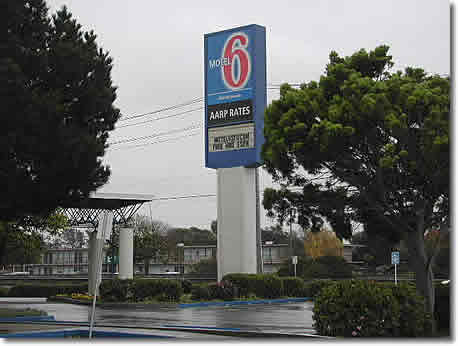
I went off to Motel 6 to get a shower and some rest, but as it turned out, getting a shower was not as simple as I thought. I was undressed and ready to step into the shower when I noticed that the shower knobs were missing.
At the Motel 6 office I said there was a "problem."
"The knobs are missing in my shower," I said. The office manager did not try to recast the problem as an issue. I was grateful for that. I think it might have led to violence.
Five minutes later a house maid brought some knobs to my room, and I was washing the sweat and grime off my body.
In the morning I woke up and took another shower. Ah, the pleasures of hot water. Then I got the free coffee down the hall and bought a cinnamon roll. I was ready to begin another day camping out in San Francisco.
I headed into The City and by some miracle found a parking spot south of Market. I walked up Bush Street to Golden Gate Perk internet cafe. I ordered a latte and set up shop up front at the counter facing Bush Street. Amy, the owner, came by and helped me connect to the right network.
"Computers are so temperamental," she said with a smile.
"Worse than that," I said. "They are downright moody. Especially when a network is involved."
I was more interested in watching pedestrians on Bush Street and Claude Lane than in reading my email but nevertheless read it. As usual, even with the highest security level set with Earthlink webmail, I had about three real emails and about 40 "suspect" ones, almost all spam. What is the point of such a system that feeds you mostly garbage? For me it is a bad way to start the day. And most of the spam had to do with increasing the size of my masculinity."Add some more male meat to your package!" "It's time your dream about big dic'd came true?" "Fill her up completely." "Make her passions come alive." Who are they talking about? I'd be happy to just buy her a cup of coffee if I could find her and she'd go out with me. I don't think she would care if I were huge or not.
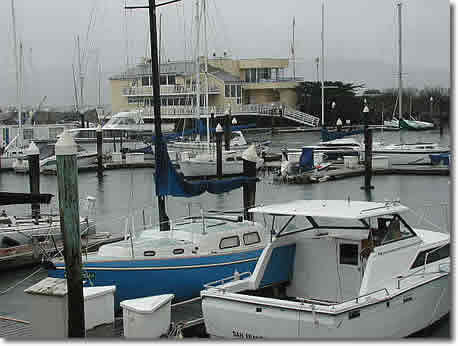
Later I dropped by the San Francisco Yacht Harbor, where there are signs everywhere about not parking, then returned to Ocean Beach, that no-man's land of pounding surf with signs that everyone ignores. I find that my heater is completely out now. So many things that don't work, so few that do. So many "issues," so little customer support.
On Friday I called the San Francisco Bar Association. I was tired of hearing Harold whine about this offshoring thing. I wanted some solid info about it. It sounded illegal to me—or at least like unfair competition. Isn't it unfair if you bid on a job and then someone in another country where the cost of living of living is far less bids one tenth of your bid to get the job? How would you ever win that way? Suppose you develop a business over a period of years, as Harold had, and invest all your money in it—maybe even your heart and soul—and then someone with no interest in the business other than the money comes along and copies every detail of it and, since they are living somewhere where it hardly costs a cent to live, offers to do what you do for almost free. Is that fair? Is that right? I believe that is what Harold was trying to tell me.
But I know that "fair" is not always fair in the American system of justice and I thought I might be able to get a referral to an expert from the Bar Association. They have been good in the past this way. But instead when I called them I was told there was no referral available. Hmm, that seemed astounding in the San Francisco Bay Area. Unless, of course, all of their lawyers were aiding companies involved in offshoring and did not want to have anything to do with the other side of the issue—the displacement of American workers and even some small businesses. Could that be the case? Maybe. But I was told there was a free clinic downtown on Saturday and that I might want to drop by and see if any of the lawyers there had an interest in the topic.
I hate to go to anything on Saturday morning—I'm a late sleeper—but I did it anyway, along with 79 other people. We all got numbers, filled out forms, and waited. My number was so high that I decided to go out and take care of some other business—I had some recycling that I had been meaning to do for a long time and drove all the way down to the San Francisco Recycling Center near Monster park where I got rid of 10 years of old flashlight batteries—then come back to the "free" and worth-what-you-paid-for-it clinic.
Eventually I was seen by a lawyer name Miles who at least showed some interest in the topic.
"The best thing for a person in your friend's position to do is to re-invent himself," said Miles.
"What about the Trade Assistance Act? Isn't that supposed to help displaced workers?" I asked.
I had read something about it. It was supposed to help those whose jobs had been impacted by offshoring. I'm not sure how they could help Harold "re-invent" himself other than as a taxi driver or a bartender but it seemed worth a try. I asked if it were possible to sue someone—the government, companies ... Miles just laughed.
"They'd toss it out of court," said Miles. "It's political."
I didn't ask about the Department of Labor under Bush but I could guess that the Bushman was involved.
I would call Harold later in the day if the T-Mobile network was back up and let him know he should "re-invent" himself. At 60, I think that would be as a chain smoker and alcoholic. But that's the American way, isn't it?
Later I decided to try camping out right downtown. I wanted to try that before I gave up my little game of camping out in San Francisco. I found a quiet spot on Stillman, south of Market between 2nd and 3rd street, and parked the van near Jack's Liquor& Deli.
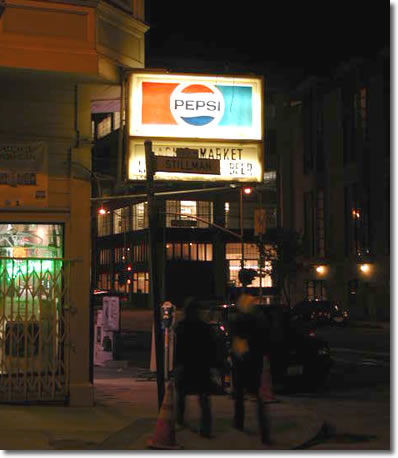
The black women in the knit cap on the corner asked for some change but I didn't have any. That could be bad luck for me; I decided I would get some change. I bought some salami at Jack's, which has only the "necessities"—beer, white bread, cheese, salami—and handed the change to the woman in the knit cap as I walked out. She smiled. I hoped that I would have better luck on Stillman than Harold was having with his life. I probably would. I was only dealing with poor people who had lost their jobs long ago; Harold was dealing with a new generation of corporate and government scoundrels who know no limits.
Home
| City Notes
| Restaurant
Guide | Galleries
| Site Map | Search
| Contact